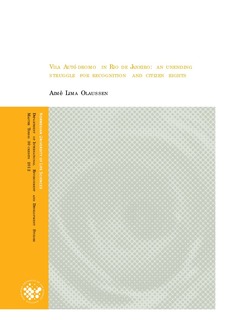| dc.contributor.author | Olaussen, Aimê Lima | |
| dc.date.accessioned | 2013-07-08T10:47:25Z | |
| dc.date.available | 2013-07-08T10:47:25Z | |
| dc.date.copyright | 2012 | |
| dc.date.issued | 2013-07-08 | |
| dc.identifier.uri | http://hdl.handle.net/11250/187832 | |
| dc.description.abstract | Vila Autódromo is one of the many favelas in Rio de Janeiro threaten by removal by due to the 2016 Olympic Games happening in Rio Janeiro. The community has fought with the government of Rio de Janeiro’s city against eviction since 1993, however their battle has intensified greatly during the past two years since the area occupied by Vila Autódromo will neighbor the Olympic Park and the Olympic Village. These structures will be partially financed by the private real estate capital and will be sold as private properties after the games in a highly valued piece of land. The community, however, has not been intimidated by the pressures exerted by the City Hall’s current administration and the private capital and has equally intensified their resistance. Organized into a residents’ association that represents the community before the public organs, their strategies are divided into main fields: working for the juridical part of their case and developing a network that includes partners and collaborators.
This thesis proposes to present a full report of their case as the actors involved in it. It also provides an historical and geographic background that works to contextualize Vila Autódromo and their struggle into the broader context of socio-economic inequalities in Brazil and the fight of favelas’ communities for citizen rights. Drawing on two months of fieldwork in Rio de Janeiro I have collected the data necessary to the report of their case, and in addition, I sought to gain their perspective of the situation which, would be ultimately, used to guide my analysis. Because I wished to analyze the case from the association’s point of view, it was essential to apply a research design and methodology that provided the necessary flexibility for changes along the process. I have chosen therefore, to develop this research within the frames of a case study.
Their case provides us with valuable insights into how the strong social stratification of Rio takes place on the local sphere and to observe the relationships that concretize these differences into a spatial stratification. Vila Autódromo stands out as a symbolic case to social movement groups that defend the expansion of civil rights in Rio because it provides these groups with a clear-cut case of social discrimination and spatial stratification carried out both by State agents and real estate capital. Finally, it might also contribute to our understanding of how communities living in a deeply unequal society can successfully mobilize to fight for equal rights and to break with the kind of social and political mechanisms that work to perpetuate conditions of exclusion and inequality in Rio de Janeiro and in Brazil. | no_NO |
| dc.description.sponsorship | Noragric | no_NO |
| dc.language.iso | eng | no_NO |
| dc.publisher | Norwegian University of Life Sciences, Ås | |
| dc.subject | Citizen rights | no_NO |
| dc.subject | Local organizations | no_NO |
| dc.subject | Favelas | no_NO |
| dc.subject | property rights | no_NO |
| dc.title | Vila Autódromo in Rio de Janeiro: an unending struggle for recognition and citizen rights | no_NO |
| dc.type | Master thesis | no_NO |
| dc.subject.nsi | VDP::Social science: 200::Political science and organizational theory: 240::Public and private administration: 242 | no_NO |
| dc.subject.nsi | VDP::Social science: 200::Sociology: 220 | no_NO |
| dc.source.pagenumber | 104 | no_NO |
